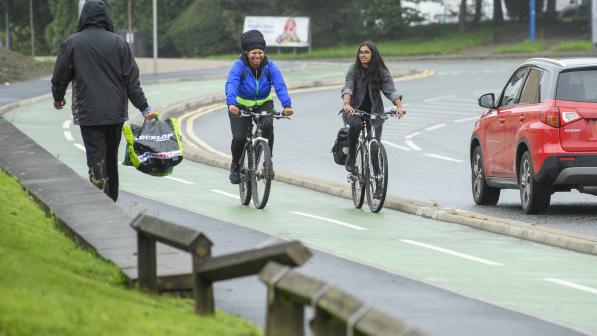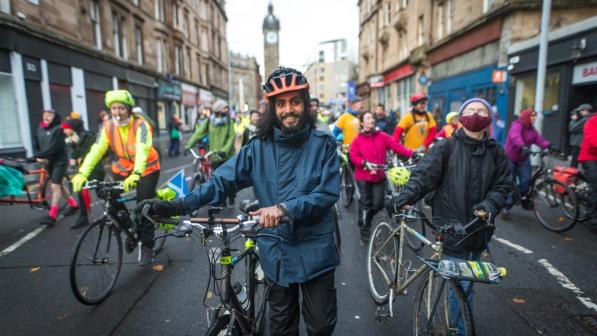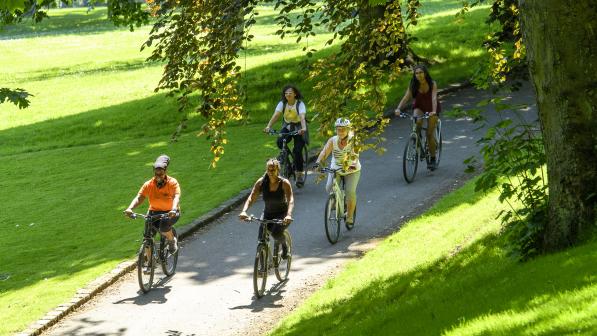Half a million more adults in Wales would cycle if streets were safer estimates Cycling UK

- Using latest research showing one in four adults (24%) in Wales would likely cycle more if streets were redesigned to be safer for pedestrians and cyclists, and one in five (21%) drive less frequently, along with census data, Cycling UK estimates 517k more adults would cycle if the streets were safer.
- Likelihood to cycle more and drive less even higher among younger people.
- As cost-of-living crisis forces families to consider driving less, Cycling UK urges Welsh politicians to create sustainable and cheap alternatives for local travel.
- Results available for download.
New research published today, Friday 22 April 2022, shows one in four adults (24%) in Wales would likely cycle more regularly if their streets were redesigned to be safer for walking and cycling, while one in five (21%) would drive less frequently.
The findings were published as cost-of-living increases across Wales are forcing many people to consider ways of saving money, including reducing their amount of car journeys.
Gwenda Owen, Cycling UK’s spokesperson in Wales, said:
“One in five people would drive less. However, previous surveys have repeatedly shown that many people won’t cycle because they just don’t feel safe enough. Now, with a cost-of-living crisis impacting some people’s decisions on travel, these same people are paying the penalty for politicians not providing safe, sustainable transport alternatives.
“It’s time for politicians to deliver what people want and need in Wales. Cycling UK is not saying ban driving, but we are saying that people should have the choice of cheap and free alternative ways of getting about, like cycling and walking, especially for local journeys.”
The poll was carried out in late March by YouGov on behalf of Cycling UK. 1047 adults (16+) in Wales were asked whether they would:
a) cycle more;
b) walk more and;
c) drive less if the streets were safer.
It found one in four (24%) were likely to cycle more often, one in two (54%) were likely to walk more often, while one in five (21%) said they would drive less frequently. Among those aged 16 -24 there was an even greater propensity to cycle or walk more if the streets were safer, with a third saying they would be likely to cycle more (37%) and drive less frequently (31%) and three quarters (74%) saying they’d be likely to walk more often.
Melanie Ryan, Youth Cymru’s joint chief executive said:
“There are so many benefits to young people being able to cycle, it gives them so much freedom to travel for work and leisure alongside reducing travel costs and increasing their independence. As with all exercise, cycling can also improve their mental health and wellbeing. Local authorities need to deliver safer and more accessible cycling routes for future generations of young people in Wales.”
Using census data and the latest YouGov polling, Cycling UK has calculated that if the streets were safer for walking and cycling, Wales could see 517,000 adults starting to cycle or cycling more frequently.
Ahead of May’s elections Cycling UK has launched its manifesto for all political parties in which it is calling on councillors to commit to:
- ensure that cycling is accessible to all wherever they live; and
- prioritise cycling to schools with school streets, Bikeability training and separated cycle routes
Gwenda Owen said “We’ve a climate emergency as declared by Welsh Government, a cost of living crisis and a burgeoning public health endemic caused by physical inactivity. Making cycling and walking easier and more attractive isn’t just what more than a fifth of the electorate wants, but it’s also crucial for the future wellbeing and prosperity of Wales.”
Cycling UK is encouraging Welsh voters to support its manifesto by signing their petition.
Notes to editors
- Cycling UK, the UK’s cycling charity, imagines a world where the streets are free of congestion and the air is clean to breathe, where parents encourage their children to cycle to school and everyone shares the exhilaration of being in the saddle. For more than 140 years, we’ve been making our streets safer, opening up new traffic free routes and inspiring more people to cycle more often. www.cyclinguk.org
- All figures, unless otherwise stated, are from YouGov Plc. Total sample size was 1,047 adults. Fieldwork was undertaken between 21st - 25th March 2022. The survey was carried out online. The figures have been weighted and are representative of all Welsh adults (aged 16+).
- The YouGov poll is available for download at: https://docs.cdn.yougov.com/k939rdi4d1/CyclingUK_Wales_220325_w.pdf
- Half a million more adults in Wales cycling is calculated by extrapolating YouGov's findings to ONS population figures (2.6M total number of adults 16+), while accounting for the 9% of YouGov respondents who probably already cycle at least once or twice a month or more (National Survey for Wales, Active Travel - adults). From this, about 500k (22%) of adults who currently cycle less than once or twice a month or never would be more likely to cycle more often, if streets were redesigned to prioritise the needs of cyclists and pedestrians over motorists.
- The British Social Attitudes Survey found that from 2011-2017, 62% of the British population aged 18 and over agreed that "It is too dangerous for me to cycle on the roads". More recently (2018), a YouGov survey for Cycling UK found that: 59% of respondents in Wales (18+) agreed that "Having to share the road with lorries and other vehicles" would put them off ever cycling in the UK; 52% were similarly put off by "Having to cross busy roads and roundabouts with other vehicles"; and 35% by "Lack of physically segregated bike lanes (e.g. cycle lanes which use posts or curbs etc. to divide the road and cycle lane)".
- Cycling UK’s manifesto in Wales is available at: https://www.cyclinguk.org/welsh-local-elections-2022
Press contact information
For more information, please contact the national Cycling UK press office. Due to the restrictions caused by the coronavirus outbreak, currently the main press office number (01483 238 315) is not being monitored. If you would like to speak to a member of the press office during working hours (0900 - 1700) please email [email protected]. Out of hours, call 07786 320 713





